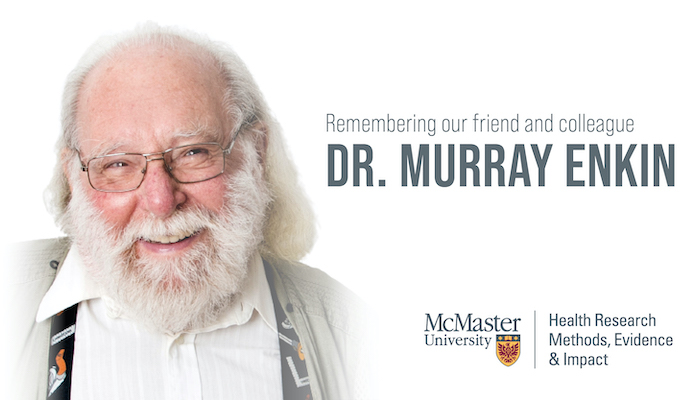HEI remembers Dr. Murray Enkin

The McMaster University community is remembering Murray Enkin, professor emeritus of obstetrics and gynecology and long-serving member of the Department of Health Research Methods, Evidence, and Impact (HEI), who passed away on June 6, 2021.
The McMaster University community is remembering Murray Enkin, professor emeritus of obstetrics and gynecology and long-serving member of the Department of Health Research Methods, Evidence, and Impact (HEI), who passed away on June 6, 2021. He was 97.
Enkin’s influential career began in the late 1940s, shortly after graduating from medical school at the University of Toronto. As a freshly minted physician, Enkin relocated to rural Saskatchewan where he practiced family medicine until an opportunity to train in obstetrics and gynecology lured him to the U.S.
Following his return to Canada, Enkin settled in Hamilton where he pioneered significant changes to pregnancy care as departmental chief of Obstetrics and Gynecology at St. Joseph’s Hospital, including the introduction of prenatal preparation courses and allowing husbands and partners into the delivery room.
In 1965, Enkin joined the faculty at McMaster’s newly established medical school, marking the beginning of a deep and enduring relationship with the University that would span decades.
“Murray Enkin was a giant in his field,” said Alfonso Iorio, chair of HEI. “He introduced practices around childbirth that became the standard of care in Canada. By all means, he was a true innovator and fully embodied the spirit of McMaster.”
By the early 1980s, Enkin’s legacy started to take shape. A collaboration with Sir Iain Chalmers, the renowned British health services researcher, resulted in the development of the Oxford Database of Perinatal Trials, the world’s first register of controlled trials in the field of perinatal medicine. It was this project that would ultimately serve as the precursor to Cochrane, an international network of researchers and patients dedicated to analyzing and summarizing the most reliable health care research.
“Murray was an astounding person who recognized the need for credible research, in particular trials in obstetrics and maternal health, to provide the best care for patients,” said Holger Schünemann, director of Cochrane Canada and professor in HEI. “His contributions to Cochrane are uncountable and he will be remembered as one of the fathers of its successes.”
It was also during the 1980s that Enkin added his voice to the growing support for midwifery to be regulated and recognized as a profession in Canada. His unflinching advocacy of midwifery was instrumental in the creation of Canada’s first university midwifery program at McMaster in 1993.
Two decades later in 2012, Enkin was awarded the Order of Canada for his contributions to maternal care and the development of midwifery in Canada.
Former colleagues said they will remember Enkin for his kindness, sense of humour and his unrivalled ability to disrupt the status quo.
“Murray Enkin was a remarkable man in so many ways, as an innovative obstetrician, clinician scientist, teacher and mentor, colleague, wise and generous friend,” said Brian Haynes, professor emeritus in HEI. “He loved life and was a role model to the end of how a good life could be lived.”
Stephen Walter, professor emeritus in HEI, added: “I know he was legendary for his many sayings, but one I always remember was on the lines of ‘there is no cure for birth or death, but it’s the bit in between that we are trying to fix.’ I have many memories of his cheery face and twinkle in the eyes.”
Gordon Guyatt, distinguished professor in HEI, described Enkin as someone who “captured the spirit of innovation and challenged authority” throughout his entire career. “He was an extraordinary man and an extraordinary friend.”
Enkin is survived by his four children Jane, Susan, Nomi and Randy. His wife Eleanor died in 2019.
Category, In Memoriam